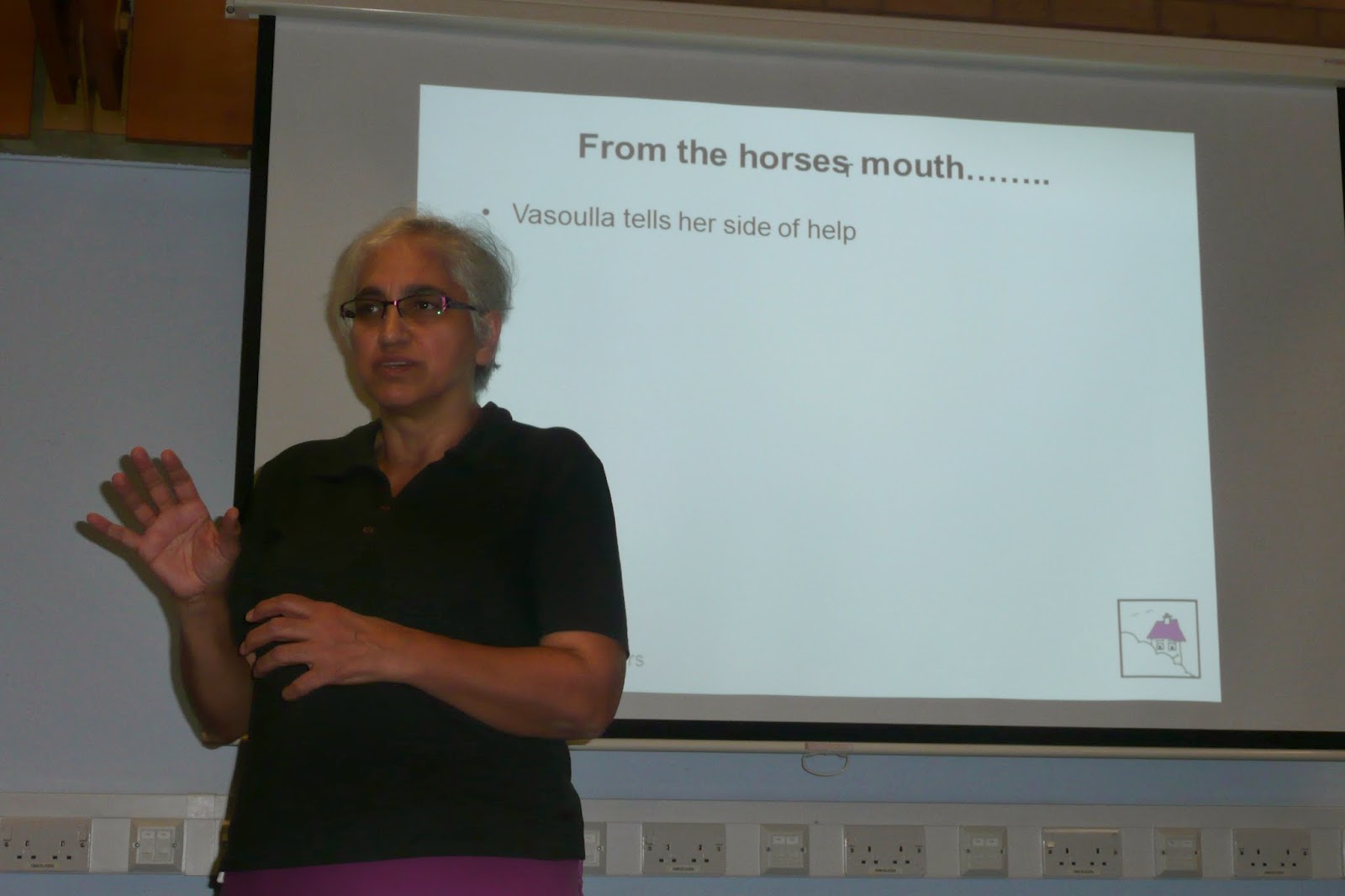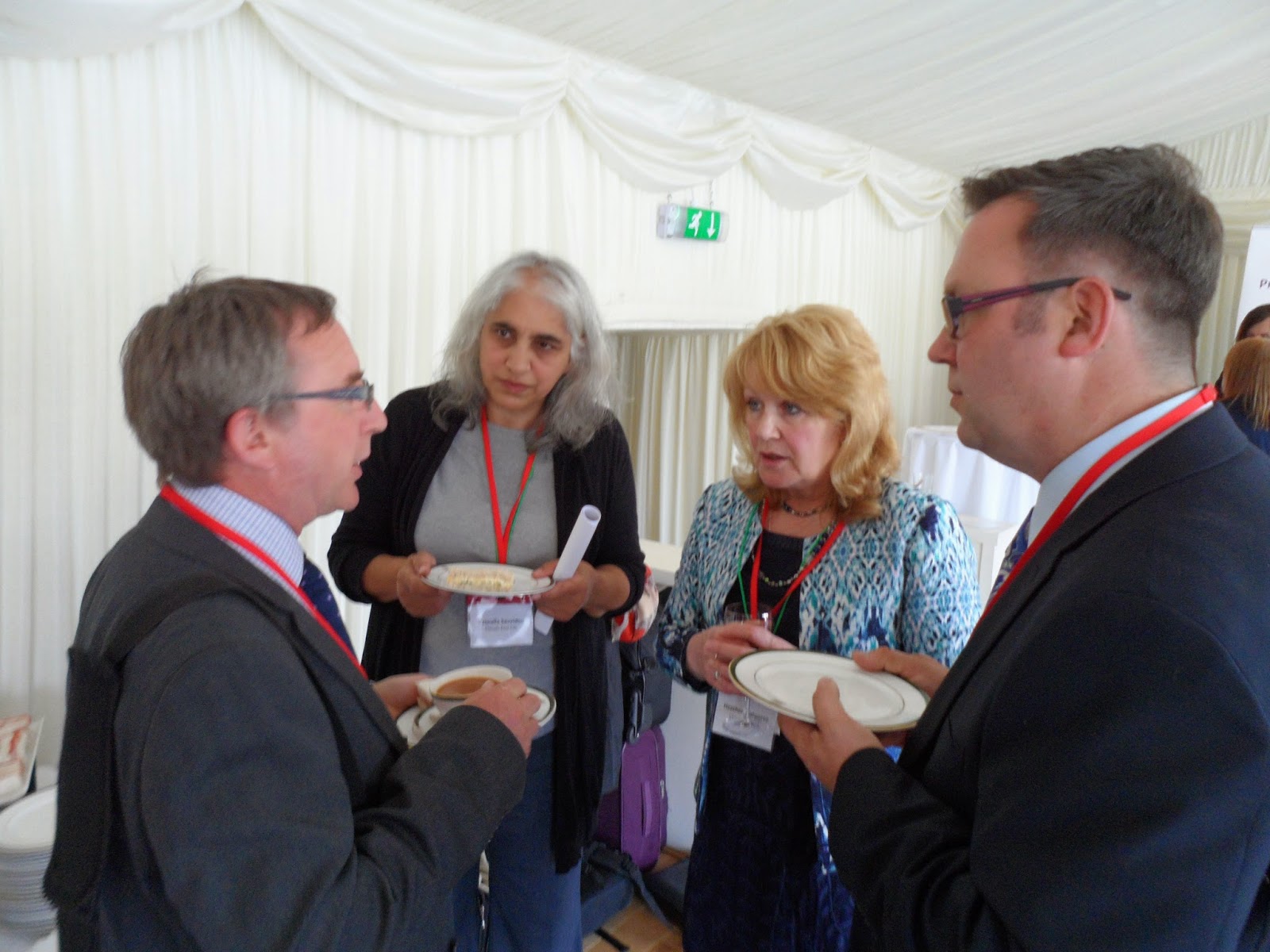On Friday 28th November 2014,
history was made
Around 10% of the Membership of The Association of Professional Declutterers & Organisers UK (apdo-uk) came together with fire officers for the UK's first ever Hoarding Awareness Training for Professional Organisers - a fun, warts and all day designed to help people decide whether they want to take on the types of challenges associated with helping people affected by hoarding.
The event was held at Surrey Fire & Rescue Service's HQ in Reigate, and was led by Heather Matuozzo of Clouds End CIC and Cherry Rudge of Rainbow Red, advisors to The Chief Fire Officers Association's (CFOA) Hoarding Working Group.
 Heather gave a fascinating insight into Hoarding Disorder - which was classified as a mental illness in The American Psychiatric Association's Diagnostic and Statistical Manual of Mental Disorders (DSM5) published in May 2013 - and outlined typical traits of individuals with hoarding behaviours; the necessity to be a detective when assessing and working with them - in order to discover what the underlying reasons are for the hoarding - and ideas for motivating people to help them with decision-making.
Heather gave a fascinating insight into Hoarding Disorder - which was classified as a mental illness in The American Psychiatric Association's Diagnostic and Statistical Manual of Mental Disorders (DSM5) published in May 2013 - and outlined typical traits of individuals with hoarding behaviours; the necessity to be a detective when assessing and working with them - in order to discover what the underlying reasons are for the hoarding - and ideas for motivating people to help them with decision-making.Professional organisers thinking of working with individuals with hoarding tendencies were left under no illusion about how overwhelming and time consuming it can sometimes be when working with them.
Bryn Strudwick - Group Commander, Community Safety Manager of Surrey Fire & Rescue Service - outlined examples of fire safety dangers associated with hoarding, and what can be done to reduce the risks. Shocking photos demonstrated where people hadn't appreciated the risks to them and their homes.
 Delegates were given a copy of Surrey Fire & Rescue Service's brand new Multi Agency DVD Staff Training Package, entitled Keeping YOU Safe from Fire Campaign. The pack is designed to help agencies work with them to protect vulnerable people in Surrey living in the community from the risks fire.
Delegates were given a copy of Surrey Fire & Rescue Service's brand new Multi Agency DVD Staff Training Package, entitled Keeping YOU Safe from Fire Campaign. The pack is designed to help agencies work with them to protect vulnerable people in Surrey living in the community from the risks fire.
 Vasoulla Saviddou - who appeared on TV in Britain's Biggest Hoarders in 2012 - gave a fascinating insight into her personal experiences of having hoarding behaviours, and how it felt for her to have professional organisers helping her.
Vasoulla Saviddou - who appeared on TV in Britain's Biggest Hoarders in 2012 - gave a fascinating insight into her personal experiences of having hoarding behaviours, and how it felt for her to have professional organisers helping her.
Bryn Strudwick - Group Commander, Community Safety Manager of Surrey Fire & Rescue Service - outlined examples of fire safety dangers associated with hoarding, and what can be done to reduce the risks. Shocking photos demonstrated where people hadn't appreciated the risks to them and their homes.
 Delegates were given a copy of Surrey Fire & Rescue Service's brand new Multi Agency DVD Staff Training Package, entitled Keeping YOU Safe from Fire Campaign. The pack is designed to help agencies work with them to protect vulnerable people in Surrey living in the community from the risks fire.
Delegates were given a copy of Surrey Fire & Rescue Service's brand new Multi Agency DVD Staff Training Package, entitled Keeping YOU Safe from Fire Campaign. The pack is designed to help agencies work with them to protect vulnerable people in Surrey living in the community from the risks fire. Vasoulla Saviddou - who appeared on TV in Britain's Biggest Hoarders in 2012 - gave a fascinating insight into her personal experiences of having hoarding behaviours, and how it felt for her to have professional organisers helping her.
Vasoulla Saviddou - who appeared on TV in Britain's Biggest Hoarders in 2012 - gave a fascinating insight into her personal experiences of having hoarding behaviours, and how it felt for her to have professional organisers helping her.
Heather commented: "Many
thanks to Bryn Srudwick for organising a 'groundbreaking' and 'pioneering'
training session - combining some natural partners for helping people with
hoarding issues."
Final thought…
Never
underestimate the power of your actions.
With
one small gesture you can change a person’s life.
For
better or for worse….
Delegate feedback
"The 'Working with Hoarders' training day today in Reigate was brilliant! Thank you both Cherry and Heather (and Andy and Vassoulla). I feel my understanding of my work is improved whether I eventually work with serious hoarding or not."
"Very insightful and I believe a must for everybody working with hoarders or contemplating to do so. What a brilliant day! Thanks so much.""The info day at Reigate was just great. So informative and interesting. I'm so glad I managed to get there.""Thanks Heather and Cherry - found it very useful, not least as it really brought home what working with hoarders might involve."
Further hoarding awareness training for professional organisers planning on working with hoarders is planned, in association with Fire & Rescue Services across the UK.
























